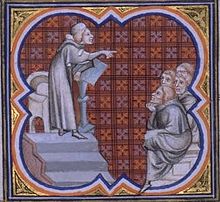Amaury de Bene
| Amalric of Bena | |
|---|---|

14th century picture of Amalric of Bena. He appears to be teaching people.
|
|
| Born | Late 12th Century Bennes, Kingdom of France |
| Died | Circa. 1204-1207 Paris, Kingdom of France |
| Nationality | French |
| Other names | Amaury De Bène (French), Amalricus (Latin) |
| Education | University of Paris |
| Occupation | Dialectician, Theologian |
| Known for | Founder of Amalricianism |
Amalric of Bena (French: Amaury de Bène, Amaury de Chartres; Latin: Almaricus, Amalricus, Amauricus; died c. 1204–1207 AD) was a French theologian and sect leader, after whom the Amalricians are named.
Amalric was born in the latter part of the 12th century at Bennes, a village between Ollé and Chauffours in the diocese of Chartres.
Amalric taught philosophy and theology at the University of Paris and enjoyed a great reputation as a subtle dialectician; his lectures developing the philosophy of Aristotle attracted a large circle of hearers. In 1204 his doctrines were condemned by the university, and, on a personal appeal to Pope Innocent III, the sentence was ratified, Amalric being ordered to return to Paris and recant his errors.
His death was caused, it is said, by grief at the humiliation to which he had been subjected. In 1209 ten of his followers were burnt before the gates of Paris, and Amalric's own body was exhumed and burnt and the ashes given to the winds. The doctrines of his followers, known as the Amalricians, were formally condemned by the fourth Lateran Council in 1215.
Amalric appears to have derived his philosophical system from Eriugena, whose principles he developed in a one-sided and strongly pantheistic form.
Three propositions only can with certainty be attributed to him:
Because of the first proposition, God himself is thought as invisible and only recognizable in his creation.
These three propositions were further developed by his followers, who maintained that God revealed Himself in a threefold revelation, the first in the Biblical patriarch Abraham, marking the epoch of the Father; the second in Jesus Christ, who began the epoch of the Son; and the third in Amalric and his disciples, who inaugurated the era of the Holy Ghost.
...
Wikipedia
